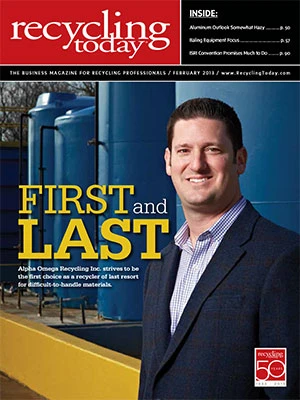 Making Headlines in 1963...
Making Headlines in 1963...
Jan. 16: Khrushchev Claims to Have a 100-Megaton Nuclear Bomb
April 9: Winston Churchill Becomes First Honorary U.S. Citizen
June 16: Valentina Tereshkova (USSR) is First Woman in Space Aboard Vostok 6
Nov. 22: American President John F. Kennedy Assassinated by Lee Harvey Oswald in Dallas
 Business Trends
Business Trends
Consolidation Wave
Stanton A. Moss, principal of nonferrous brokerage firm Stanton A. Moss Inc., Bryn Mawr, Pa., recalls that the scrap industry was beginning a wave of consolidation in the mid- to late 1960s.
“Diversified was looking for companies to buy,” he says of the St. Louis firm founded by Ben Fixman as Fischer-Fixman Metals.
In 1968 Diversified merged with Sam Lefton’s Aluminum Services Corp. As a result of the acquisition, Morris Lefton, who went on to form St. Louis-based Metal Exchange in 1974 with Howard Estabrook, began working for Diversified, eventually becoming president.
Industry Leaders
Recycling Pioneer
According to Kataman Metals’ website, www.katamanmetals.com, Diversified Metals developed a mechanical method for processing insulated scrap wire and cable, revolutionizing the scrap metal recycling industry and earning Fixman the title “Man of the Century” by “Iron Age” magazine in 1969.
Kataman Metals, a nonferrous metals trading firm based in St. Louis, was formed in 1993 by Shig Katayama and Fixman.
 Consuming Markets
Consuming Markets
The Brass Corridor
Thanks to the concentration of clock and switch manufacturers and flatware and hollowware producers in Connecticut, a number of brass mills called the state home in the 1960s. In fact, Waterbury, Conn., was once known as the world’s brass capitol. Larry Sax, a veteran of the nonferrous recycling industry and a long-time contributor to Recycling Today Global Edition, says, “Before aluminum, plastics and imported material became competition for brass, the industry was booming in the state of Connecticut.”
The mills were finicky consumers of scrap, because no refining was being done at the time. As Sax puts it, “Whatever went into the furnace was in the furnace. They had to be very selective and choose their scrap suppliers very carefully.”
Boston-based J. Sax and Co., a scrap company owned by Larry’s uncle, was a prime supplier to the Connecticut brass mills. The firm took pains to educate its suppliers on properly segregating material.
Among the companies operating in Connecticut during the 1960s were:
- Bridgeport – Bridgeport Brass Co.; Bridgeport Rolling Mills
- Meriden – Meriden Rolling Mills
- New Haven – New Haven Rolling Mills
- Stamford – Stamford Rolling Mills; Western Brass Co.
- Waterbury – American Brass; Anaconda-American Brass; Chase Brass and Copper; Bristol Brass; Scovill Manufacturing; Waterbury Rolling Mills.

Explore the February 2013 Issue
Check out more from this issue and find your next story to read.
Latest from Recycling Today
- Orion ramping up Rocky Mountain Steel rail line
- Proposed bill would provide ‘regulatory clarity’ for chemical recycling
- Alberta Ag-Plastic pilot program continues, expands with renewed funding
- ReMA urges open intra-North American scrap trade
- Axium awarded by regional organization
- Update: China to introduce steel export quotas
- Thyssenkrupp idles capacity in Europe
- Phoenix Technologies closes Ohio rPET facility





